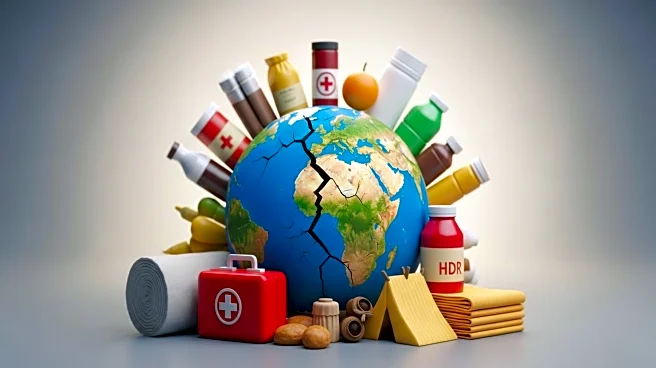What is the story about?
What's Happening?
The United Nations has emphasized the urgency of clearing debris and rebuilding in eastern Afghanistan following a devastating earthquake on August 31. The 6.0-magnitude quake resulted in the deaths of at least 2,200 people and caused significant damage to low-rise buildings in the mountainous region. The UN Development Program reported that approximately 40,500 truckloads of debris need removal. The Taliban government and humanitarian groups face challenges in reaching remote areas, with efforts including helicopter deployments and airdropped army commandos. Aid workers have been providing cash, food, tents, and other necessities to affected families, who are currently sleeping in the open. Reconstruction of homes and water supplies are among the primary needs identified by survivors.
Why It's Important?
The earthquake has compounded Afghanistan's existing crises, including economic struggles, aid cuts, and climate-related stressors. The disaster highlights the need for international support and effective governance to address these challenges. The UN's call for swift action underscores the potential for further humanitarian issues if debris removal and reconstruction are delayed. The situation affects not only the immediate survivors but also the broader stability and development prospects of Afghanistan, which is already facing significant population returns from neighboring countries.
What's Next?
Efforts to rebuild infrastructure, including roads in the Dewagal Valley, are underway, with plans to construct roads in previously inaccessible areas. Various countries and organizations have offered assistance in housing construction, although this will take time. The UN and other stakeholders will likely continue to monitor and support the recovery process, emphasizing the need for sustainable development to mitigate future crises.
Beyond the Headlines
The earthquake's impact on Afghanistan highlights broader issues of governance and international aid effectiveness. The Taliban government's ability to manage such crises is under scrutiny, affecting its legitimacy and relations with international partners. Long-term recovery will require addressing systemic issues, including restrictions on personal freedoms and economic development.
















